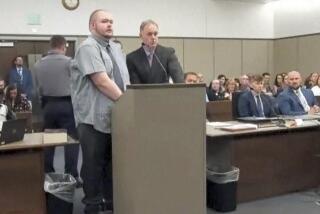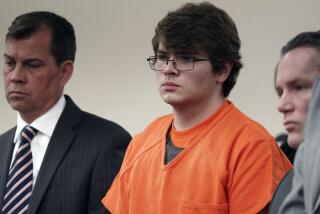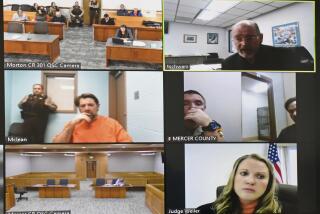Judge enters not guilty plea for defendant in Colorado rampage
CENTENNIAL, Colo. — The judge presiding over the Aurora movie theater shooting, appearing impatient at the pace of the proceedings, entered a not guilty plea on behalf of suspect James E. Holmes on Tuesday and set a trial date for Aug 5.
Also, George Brauchler, the newly elected district attorney for Colorado’s 18th Judicial District, said in court that he would announce April 1 whether he would seek the death penalty for Holmes.
When public defender Daniel King asked to postpone the arraignment because the defense team, citing the complexity of the case, was not ready to enter a plea, a sigh could be heard from the courtroom gallery filled with dozens of victims and their family members.
“We cannot ethically stand before you and enter a plea,” King told Chief Judge William Sylvester.
“How much time do you need?” Sylvester asked crisply, reminding King that the arraignment was moved from January to March to give the defense more time to contemplate a plea. When King said he could not give a firm date, the judge took matters into his own hands.
He entered what he described as a “standard not guilty” plea from the bench.
It was widely anticipated that if Holmes entered a plea Tuesday it would be not guilty by reason of insanity. Defense motions challenging the constitutionality of Colorado’s insanity plea process were filed 12 days ago. If Holmes is found to be insane or suffering from a mental defect at the time of the crime, he cannot be executed.
Sylvester ruled last week that the constitutionality of the process had already been upheld in other courts. But he told defense attorneys Tuesday that they could change to an insanity plea at a later date.
Holmes faces 166 counts in connection with the shooting. Twelve people died and 70 were wounded in the rampage during a packed midnight premiere of “The Dark Knight Rises.”
Holmes, 25, remained silent throughout the proceedings, sitting shackled in maroon jail pants and shirt, staring straight ahead.
When the defense talked about delaying the plea, some people in the courtroom cried softly or buried their faces in their hands; others glowered at the defense table. The prosecution said 75 victims had said they were opposed to further delays.
Holmes’ parents, Arlene and Robert Holmes, attended the proceedings and sat quietly holding hands, showing no emotion when the plea was entered for their son.
Craig Silverman, a former chief deputy district attorney in Denver who has closely followed the case, said Tuesday’s developments offered a mixed bag for both sides. On the one hand, the prosecution scored because the judge pushed the case closer to trial. Delays typically benefit defendants.
But the defense will now know if the death penalty is at stake before making a determination about an insanity plea.
If the defense decides to pursue an insanity defense, it will probably change the tenor and timeline of the case. Holmes would immediately undergo rigorous state psychiatric testing. The defense has argued that such testing — especially in the context of a death penalty case — could put Holmes’ constitutional rights against self-incrimination and due process at risk depending on whether he cooperated with examiners.
Holmes could also lose the protection of doctor-patient privilege in his prior mental health history, defense motions have said. That could be important in this case because Holmes met with a University of Colorado at Denver psychiatrist once about six weeks prior to the shooting.
Sylvester ruled last week that the state psychiatric testing did not violate Holmes’ rights.
Capital punishment is rare in Colorado, with only three people on death row — all coincidentally from the 18th Judicial District. The last person put to death was executed in 1997. Further complicating the Holmes case is the current debate in Colorado over whether the state should abolish the death penalty.
More to Read
Start your day right
Sign up for Essential California for news, features and recommendations from the L.A. Times and beyond in your inbox six days a week.
You may occasionally receive promotional content from the Los Angeles Times.






